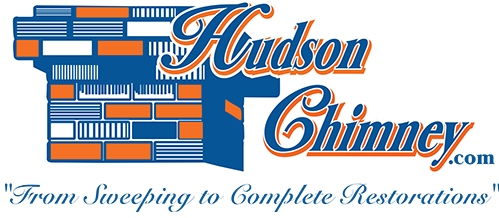by Mark Hudson | Mar 10, 2015 | Fire Safety Tips
You may or may not have a fireplace in your home, but even if you do not have a fireplace, there is always a possibility of a house fire. If a fire does break out in your home, you may only have as little as two minutes to be able to escape. The best way to protect yourself and your family is the identification and removal of all fire hazards from your home. Another excellent way to protect yourself, your family, and your home is to know and follow important home fire safety tips. At Hudson Chimney, we like to educate our customers on fire safety, and we would like to share with you some fire safety tips we feel are essential.
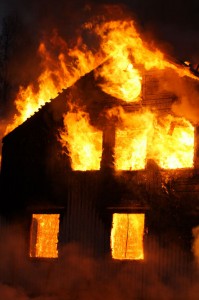
Install Multiple Smoke Alarms Throughout Your Home.
The Red Cross states that 60% of house fire deaths occur in homes with no smoke alarms installed. Smoke alarms should be installed on every level of your home, inside bedrooms, and outside sleeping areas. Make it a monthly routine to check your smoke alarms to be sure they are still working properly. Smoke alarms will usually last for at least 10 years; however, you will have to change the batteries to keep them working properly.
Create an Escape Plan to Have in Place for Your Entire Family.
Everyone in your home should know two ways to escape from every room in your home. Designate a meeting place outside the house to be sure everyone has gotten out safely. Use a two-minute time frame when you are planning your escape routes. Practice your escape plan with your family on a regular basis to be sure everyone knows how to proceed if an emergency should occur. Include waking up to smoke alarms, low crawling, and meeting outside during your escape plan practices. Be sure everyone in the house knows how to dial 911. Teach family members how to stop, drop, and roll if their clothes happen to catch on fire.
Be Safe in the Kitchen.
Never leave the kitchen unattended when cooking, frying, or broiling food, and do not leave your home when roasting, boiling, baking or simmering food. Set a timer to alert you when your food should be done cooking, baking, boiling, or roasting. Keep all flammable items like pot holders, towels, clothing, and plastic away from the stove. Keep all pets off cooking surfaces and countertops to prevent them knocking things onto the burners and to protect them from possibly burning themselves.
Use Common Sense.
Keep flammable items at least three feet away from space heaters, fireplaces, and other heating appliances. Turn off portable heaters when you leave the room and when you go to sleep. Never smoke in bed. Talk to your children on a regular basis about the dangers of fire. Always keep matches and lighters out of reach from children.
Know the Dangers of Carbon Monoxide.
Just as you do with smoke alarms, install carbon monoxide detector alarms on every level of your home, inside bedrooms, and outside sleeping areas. If one of these alarms goes off to alert you of the presence of carbon monoxide in your home, move quickly to the fresh air outdoors or stand by an open window or door. Never use generators, grills, camp stoves, or any other gasoline, propane, natural gas, or charcoal burning devices inside a home, a garage, basement, crawlspace, or other partially enclosed space.
Want to know more home fire safety tips? Contact our staff at Hudson Chimney. Fire safety education is part of our duties as CSIA-certified chimney sweeps, and we take pride in teaching our customers about fire safety procedures and precautions.
by Mark Hudson | Feb 26, 2015 | Top Sealing Damper
According to the Chimney Safety Institute of America (CSIA), a damper is an important component of every chimney. Essential for an energy-efficient home, the damper keeps the heat in and the cold air out of your house, which saves you money on heating bills. Your damper is also used to control the flow of smoke, gases, and the other byproducts of combustion up the chimney to exit your home. Available in two different types, you can choose between the throat damper and the top-sealing damper. Also known as the traditional fireplace damper, a throat damper is installed right above the firebox and is found in many old masonry chimneys. However, this type of damper has many flaws and issues. At Hudson Chimney, we strongly recommend the top-sealing damper over the throat damper. We would like to tell you more about the benefits of these dampers.
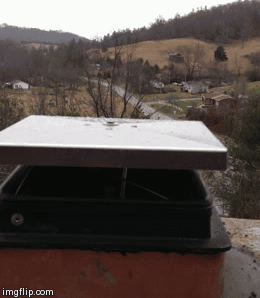
This clip is courtesy of Richie Baxley at Environmental Chimney Service in Asheville NC.
A top-sealing damper serves two functions, allowing you to “kill two birds with one stone.”
One of the main benefits of a top-sealing damper is that it also serves as a chimney cap when the damper is closed, and, to be honest, this type of damper actually gives you better protection than an ordinary chimney cap. Equipped with a silicone rubber gasket that seals in heat and air conditioning as a damper, a top-sealing damper also gives you an air-tight seal to keep out water, debris, birds, squirrels, and raccoons — just as a chimney cap would. When our customers need a new chimney cap, Hudson Chimney will recommend that they install a top-sealing damper instead of a chimney cap. Some models of top-sealing dampers come with caps, so even when the damper is open, your chimney is still protected from debris and animals.
A top-sealing damper will save you both energy and money.
Throat dampers just do not completely seal as well as top-sealing dampers. You will not have to worry about cold air, ice, and snow entering your flue to create a cold core in your chimney. A cold core tries to cool your home at the same time that your heating system is trying to warm it up, which wastes both fuel and money. As a top-sealing damper sits atop your chimney, cold air never even has a chance to get anywhere inside because your entire flue is sealed air-tight with the silicone rubber gasket. Believe us when we say you will save money on both cooling and heating bills when you install a top-sealing damper.
A top-sealing damper is easy to operate.
With some throat dampers, you must practically stick your head up the fireplace to open and close them. When you have a top-sealing damper, opening and closing the damper is simple. A stainless steel cable from the damper drops down the chimney and connects to an easily-accessible handle which is mounted inside the firebox. Different models will have different opening and closing methods, but Hudson Chimney guarantees you will find all easy to use.
Want to know more about the benefits of top-sealing dampers? Contact Hudson Chimney to find out even more advantages to this type of damper.
by Mark Hudson | Nov 30, 2014 | Ash Disposal
If you have a wood burning chimney, you may be unsure of how to properly and safely dispose of the remaining ash in your firebox. You may also be unsure as to how often you should have your fireplace and chimney professionally cleaned. The experts at Hudson Chimney have the expertise and skill necessary to answer all of your questions regarding your fireplace and chimney as well as to clean and help you maintain and repair your chimney.
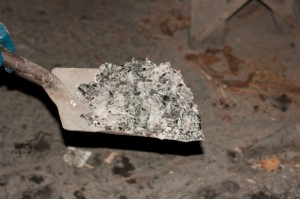
When you are emptying your firebox of ash, it is important that you protect your hands from leftover embers by wearing leather gloves. Use a metal scoop to transfer the ash from your firebox to a metal bucket and add a little water. Place the bucket in a location away from any combustible materials (outside the home is best), and let it sit. It is also a good idea to use the metal scoop to mix the ash and break up any chunks before you let it sit. According to The National Garden Association, the ash can be used as a fertilizer for your gardens. However, this is not the case when you burn cardboard, treated wood, or painted wood, which create toxic ash and should not be burned in the first place, as they also release toxic fumes when they are burned.
When you do remove ash from your firebox, according to the Chimney Safety Institute of America, it is beneficial to leave some of the ash. The CSIA recommends that you leave a layer of ash that is one inch thick on the bottom of your firebox in order to make building and maintaining a fire easier, create hotter fires, and protect the floor of you firebox. However, it is still important to clean your firebox because leaving more than a one inch layer can lead to the premature burn out of your grate as well as decrease the amount of fuel you can add to your fire. If you do leave a layer of ash, make sure to remove this layer at the end of chimney season, when you will no longer be using your chimney.
It is also important to have your chimney cleaned by a professional at least once a year. Only a professional can thoroughly clean your chimney as well as remove all of the creosote that has built up. Creosote, which is very flammable, is created as a byproduct of wood burning fires when hot smoke and gases hit the cool sides of your chimney. It is important to have creosote professionally removed so it does not build up into glazed creosote, which can only be removed from your chimney with chemicals.
Call Hudson Chimney if you have any questions about the proper disposal of ash or if you have not had your chimney cleaned yet this year. The experts there have the skill to provide you with a clean, safe, and efficient chimney for the winter.
by Mark Hudson | Oct 15, 2014 | Chimney Cap
Does your chimney have a cap? A chimney cap may seem insignificant and maybe not that important, but it serves a variety of functions to protect your chimney and home! The Chimney Safety Institute of America suggests that all chimneys have caps as a preventative measure against damage and for safety reasons. If you do not have a chimney cap or your chimney cap needs to be replaced, it is important that you call Hudson Chimney as soon as possible to install a cap in order to prevent the damages associated with not owning one.
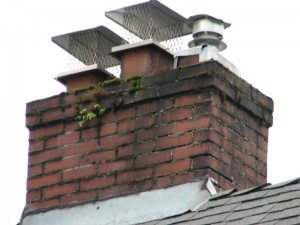
There are many reasons why it is important to keep your chimney capped. A chimney cap stops rain from getting into your chimney, preventing water damage to both your chimney and your home. Water damage can cost you a lot of money in repairs as well as destroy your chimney if not confronted quickly. While a chimney cap is important to preventing water from entering your chimney, water damage can also be prevented by having the professionals at Hudson Chimney apply a sealant to the exterior of your chimney.
A chimney cap also keeps animals out of your chimney, which can create noise, smells, and provide them an entrance into your home. Chimney caps prevent environmental debris, such as sticks and leaves, from entering your chimney as well, which can cause dangerous chimney fires. Having debris or animals in your chimney can also block smoke and fumes from efficiently leaving your chimney, which will lead to improper ventilation that will not allow dangerous fumes to exit your home. Because they prevent things from entering and blocking your chimney, chimney caps ensure that your chimney’s air flow runs efficiently. Chimney caps also help to eliminate downdrafts, which blow cold air as well as fumes from your fire back into your home. A chimney cap also protects your chimney liner and prevents sparks from flying out of your chimney and lighting things on fire.
If you are looking for a sturdy and durable chimney cap that doesn’t rust, Hudson Chimney can install a stainless steel cap for you. However, you also have the options of having a copper, galvanized, or aluminum cap installed. Consult with an expert at Hudson Chimney to determine the best cap for your chimney. No matter your choice, chimney caps are one of the least expensive chimney repairs that can be made as well as one of the simplest. Therefore, it makes financial sense to have a chimney cap installed rather than waiting for damages to occur that will cost you more!
So if you don’t have a chimney cap or if your chimney cap needs to be replaced, give Hudson Chimney a call as soon as possible. The professionals there will be sure that you have a cap installed that will protect your chimney and home.
by Mark Hudson | Sep 30, 2014 | CSIA Certified
When looking for a chimney sweep to entrust with the task of cleaning and inspecting your chimney, you may wonder how you are supposed to distinguish a good chimney sweep from a bad one. After all, you want to hire a professional who knows what he or she is doing and who can help you to protect your home from the dangers that owning a chimney can present. The Chimney Safety Institute of America is a non-profit organization that reviews and certifies chimney sweep companies in order to provide homeowners with a standard for their chimney needs.
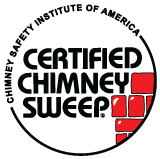
To be CSIA certified, a chimney technician must attend a review session and pass an exam covering Successful Chimney Sweeping (2011), National Fire Protection Agency 211 (2013), and the 2006 International Residential Code. Anyone applying for certification must also sign the CSIA code of ethics and pay an annual fee. In order to remain certified, this process must be repeated by the technician every three years.
These procedures for certification create a method for homeowners to determine if a chimney sweep is qualified to clean and inspect a chimney in a professional and informed manner. Chimneys and appliances can cause fires and carbon monoxide leaks if not properly maintained. Therefore, making sure your chimney sweep knows what he or she is doing in addition to being dedicated to helping you detect and fix potential problems is of the utmost importance.
It is significant to note that the CSIA not only seeks to educate and evaluate technicians, but also to provide an ethical code for professionals to follow. When technicians sign this code, they pledge to conduct business in an honest and fair manner, as well as to remain knowledgeable and up to date on all chimney standards and procedures. They also agree to do their best to educate you, the consumer, and to act in a professional and respectful manner.
Hudson Chimney is certified by the CSIA, so you can be sure that you will be in good hands. The technicians at Hudson Chimney have been servicing the Jacksonville, Florida Area for over thirty years, ensuring their clients clean, safe, and warm homes with efficient heating systems. You can trust the professionals at Hudson Chimney to be knowledgeable in their skills and to provide you and your appliances with service of the highest quality.
If you have any questions about CSIA certification or policies, or if you have any questions about chimneys and appliances as a homeowner, be sure to check out CSIA.org for more information. Their website is an informative and reliable resource of educational material for your benefit.
Also, if your chimney has not been serviced this year yet, schedule an appointment with a technician at Hudson Chimney as soon as possible. The fall and winter are busy for any chimney servicing company, and the sooner you call, the more likely your home will be prepared for the colder winter months. The professionals at Hudson Chimney will make sure your chimney is prepared!
